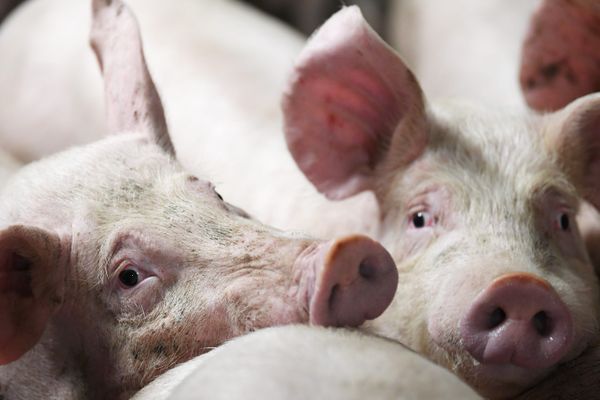The Space opened its doors this Tuesday, September 12, 2023 in Rennes, which becomes the European capital of breeding for three days. Among the dominant topics in the exhibition stands, energy autonomy, but also, as in recent years, animal welfare. A concern undermined by the need for mass production to face the wall of inflation.
How can we improve the welfare of pigs, poultry and other livestock? This question is a headache for breeders keen to respond to this growing societal concern, without jeopardizing the profitability of their farms. At the Rennes international livestock exhibition (Space), which opened its doors this Tuesday, September 12, 2023, the breeders met explained that they had already started.
The NGOs are calling for “reducing densities on farms, banning mutilations such as docking of tails, trimming of poultry beaks, dehorning of cattle”, “access to the open air or at least to the open air “in courtyards,” explains Ghislain Zuccolo, general director of the Welfarm farm animal protection association. “The animals’ living environment must be enriched to stimulate them.”
“The first subject is animal grazing”
Pig, calf, laying hen and chicken farming are regulated in the European Union by specific directives, many of which date from the 1990s. Nothing, however, for dairy cows, rabbits or goats. The European Commission is committed to dusting off this legislation to take into account societal expectations and scientific advances.
“The first subject is animal grazing”, synonymous with well-being for the general public, Mickaël Lamy, of Anicap (National Interprofessional Goat Association), tells AFP. But it can lead to parasitism and “the land is not extensive”, notes the breeder.
Alternative options for goats raised in buildings are “access to the outdoors in parks or enrichment devices in buildings,” continues Mr. Lamy, such as platforms allowing the goats to be at height.
Concerning outdoor or indoor breeding, “we cannot conceive of things as being good on one side and bad on the other”, adds Alain Boissy, research director of the National Research Institute for agriculture, food and the environment (INRAE). Outdoors, “there are health risks, predation, and climatological hazards”.
A profound evolution of the breeder profession
Improving animal welfare changes the work of breeders, for Christophe Prodhomme, a dairy farmer in Ille-et-Vilaine, whose 85 cows live in the meadow for a large part of the year. After birth, its calves are fed in individual pens. If they were to be put together, “it would complicate the breeder’s monitoring” in the event of illness.
In the pork and poultry sectors, which are often singled out, things are also changing. France prohibits live castration and the systematic cutting of piglets’ tails. The European Commission plans to ban cages in the EU by 2027.
For Bertrand Houzé, president of the Elpor cooperative which supplies a subsidiary of Leclerc, animal welfare is “the hot topic”. “Major distribution is very keen on this,” notes this Costa Rican breeder. “We must get ahead of the regulations.” He himself modifies his maternity block so that the sows spend less time in the farrowing cage.
Higher production costs
Providing animals with outdoor access, modifying buildings or their living conditions increase production costs, without breeders selling their animals more expensively, they point out.
The question of additional costs induced by improving animal welfare is essential, agrees Hervé Guyomard, deputy scientific director of Agriculture at INRAE. He gives as an example the pig industry where “it can go as far as doubling the price of a building”.
The consumer is ready to pay more, “but not up to the additional costs” and he is less willing to do so in times of inflation, says the economist. The other options are “technological innovations to reduce these additional costs” and “financing through public policies”.
“The concrete translation in favor of animal welfare is undoubtedly still insufficient today given the scale of the challenges and expectations,” he adds. Livestock breeding needs a “long-term policy of support, to have a course and keep it” to improve the well-being of animals, underlines Alain Boissy of INRAE, taking advantage of the “phase of renewal of generations” in agriculture.
This article is originally published on france3-regions.francetvinfo.fr







